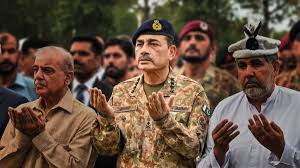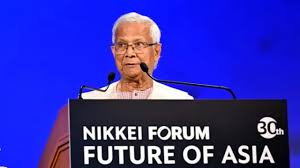A broad array of covert and overt means, employed consistently over a long term, may turn out to be more effective in neutralizing Pakistani proxy war. These include creating a powerful narrative while enlisting authentic messengers to defeat its Islamist ideology
By Ankineedu Prasad Nallapati*
As dust settles down in the subcontinent’s battleground, there are increased signs of a new geo-political situation taking shape, challenging India’s security and its regional interests.
Claims and counterclaims of military `gains and losses’ apart, Pakistan appeared to have made some gains, at least in the short run, in the objectives set out for its terrorist attack in Pahalgam, in Jammu and Kashmir, killing 26 tourists.
Its Army Chief Gen. Asim Munir, facing smack from all sides, has succeeded in getting the whole country rally behind him. This includes even imprisoned Imran Khan, who became the rallying point for opposition that targeted the Army for forcefully deposing him from power.
Gen Munir, the new hero, elevated himself to the highest military rank, Field Marshal.
There are also no signs of Pakistan feeling deterred by India’s heightened military response to the terrorist attack hitting them right in their heartland.
World focus returned to Kashmir and nuclear susceptibility while kicking terrorism down the line, much to the chagrin of India.
President Trump smells an opportunity to intervene in the subcontinent for adding credits to his political `deal making’ talent and maximizing economic dividends from both India and Pakistan. He does not care if he is disrupting a delicate balance and re-hyphenating the arch rivals.
Current leadership in Bangladesh led by Muhammad Yunus is lending a helping hand to China and Pakistan to break off India’s north-eastern region. His statements in China and in talks with Nepali leaders suggest a joint approach to the region, keeping New Delhi out.
Beijing is reportedly encouraging Bangladesh to revive its World War-2 vintage Lalmonirhat airbase, close to India’s narrow Siliguri corridor that connects India to its northeast. This, if true, will have serious military implications. Military interactions between Pakistan and Bangladesh, revived recently, are also showing an upsurge.
India Needs to Reconsider its Strategy
India did score military points with Op: Sindoor but that could not help it achieve its political objectives. It wanted to create a new `deterrence’ against any future terror attacks by Pakistan.
With the military dominance thus proven inadequate, India needs to reconsider its strategies toward its errant neighbour.
A broad array of covert and overt means, employed consistently over a long term, may turn out to be more effective in neutralizing Pakistani proxy war. These include creating a powerful narrative while enlisting authentic messengers to defeat its Islamist ideology.
Op: Sindoor has again proven India’s foundational faith of `unity in diversity’. The whole country stood up in unison to condemn Pakistan’s terrorist activities and its General’s attempt to revive Hindu-Muslim hatred in the garb of the debunked `two-nation’ theory.
This is the strength that India often ignored to capitalize on to counter Pakistan’s propagation of political Islam. Several Indian Muslim leaders questioned Gen. Munir’s selective use of Quranic verses to serve his political purposes.
Asaduddin Owaisi, chief of AIMIM, condemned the Pakistan Army as liars who do not practice what they preach of Quran Sharif. He said, “We (Indian Muslims) despise, we rejected the two-nation theory proposed by Jinnah and we accepted India as our country…” He further said, “Pakistan wants to divide India on religious lines and it uses Islam as a facade to cover up its promotion of terrorism.”
Who else are better suited to counter Pakistan’s political Islam than Indian Muslims themselves, who number over 270 million, much higher than the former’s population?
It’s highly helpful if the Modi government revisits some of its policies which are alienating even liberal muslims and co-opt them to jointly fight the Islamist ideologies not only in Pakistan and elsewhere in the subcontinent, including Bangladesh.
One such example that was brought to my notice by a Muslim friend is an experiment in Indonesia, with world’s largest Muslim population, that saved it from falling into Jihadi hands. As it proved there, sustained education is required to refute radical ideology.
A scholarly work, “The Illusion of an Islamic State”, helped stem the tide of the Muslim Brotherhood’s political ambitions in the Southeast Asian nation.
“While the then government stopped the publication and sale of the book, the authors released its electronic copy, free to any interested reader. This changed the outcome of their election results and prevented Indonesia from falling into the Islamist lap.”
Another example is Saudi Arabia, which has evolved from a conservative Wahabi state into a more liberal and forward looking development story, under its youthful and wise leadership.
While there are some sane voices in Pakistan also, large majority of the country is swayed by the Islamist and communal ideologies, promoted and propagated by the Army, political elite and madrasas to perpetuate their control over the country.
A prosperous and democratic Pakistan, where “informed” common citizens hold real control rather than the above vested interests, serves the interests of India and the region as a whole. This can open a number of opportunities for peace and regional development.
India may, therefore, need to conceive a larger and longer term strategy, keeping liberal voices from the Muslim community, both within the country and the region, in the front. Saudis and Indonesians can also lend a helping hand for the good of the global peace.
If such a strategy to be successful, the Modi government will have to undertake a series of domestic policy changes that create a more positive atmosphere where all sections of people see themselves a shareholder in driving national priorities.
In the shorter run, India may have to strengthen its intelligence and security apparatus while also integrating local population in Jammu and Kashmir into the new strategies to firmly put down cross-border terrorism.
(*Ankineedu Prasad Nallapati is President of the Hyderabad-based think-tank, “Deccan Council for Strategic Initiatives” and former Additional Secretary to Govt of India)




